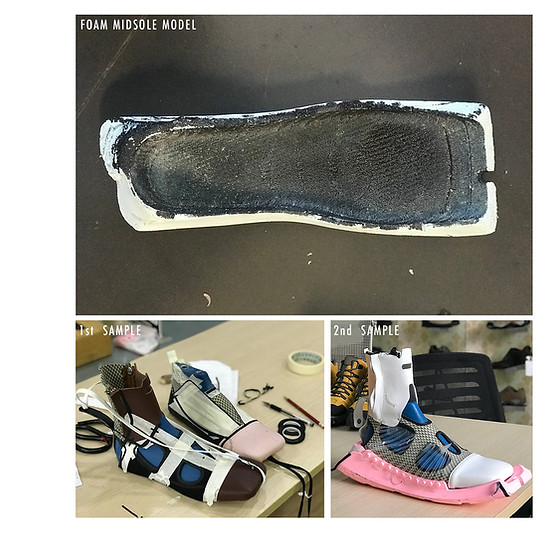
FOOTWEAR
FOR
BAREFOOT

FYP+ Supporting Scheme TOP40 Project
PolyU Student Entrepreneurial
Proof-of-Concept Funding Scheme
Winner 2023 / Special Awards / SOCIAL IMPACT


?

My FYP supervisor Ernesto Spicciolato just finished his trip to Kenya, and he adopted an African child.
He saw that in East Africa, the Third World countries, because of poverty and other reasons, numbers of people don’t have shoes, and they were suffering from foot bacteria and parasites.
So I decided to build a bridge between the developed countries’ consumers to third-world countries’ people through my final year project. Use the footwear design to raise consumers’ attention and provide them a chance to get into action, and purchase the shoes to give barefoot people shoes, This is the reason why the project is called “Footwear for barefoot”.

Due to the poverty in the East African, large numbers of East African cannot afford for shoes. The statistic indicates that more than half of the Regions of the African Union § East population is living barefoot.
Interview:
I interviewed my FYP supervisor Ernesto Spicciolato and another teaching fellow Santina Bonini, Who just had a long-term trip to East Africa, and the daughter Ernesto adopted from Kenya. (I am not permitted to show the picture of his daughter so I put a random picture here instead)
I researched with the Non-Government Organization: Projects Abroad, who hold volunteer trips to East Africa every year.
The Research

Bacteria and parasites may enter or affect them through their feet
People affected by Chigoe Flea
The wounds on the feet have high possibilities infected with bacteria and parasitic.
In Kenya and Uganda, because of barefoot, so many people get affected by Chigoe Flea which will fester the feet or even kill people.
In Uganda 2010, there was an outbreak of Chigoe Flea, 20K people got affected in 2 months, 20 people were killed.
Some local people said that their kids might get hurt by snakes or spiders

TIRE SANDALS
After the research, I found some Africans use abandoned tire to make shoes. even though the tire sandals cannot protect the whole feet, the curve of tire is Non-Ergonomic the rubber is carcinogenic and handmade is not efficient. But abandoned tires are cheapest, most endurable they can find. Also, the strong local style already made the tire shoes become an icon of African footwear.
Barefoot walking lead to wider feet of local people, especially the toes and the space between the toes.
Wider Feet
The Goal

BUILD
Rather than simply being donated
Compared to simply donate money or shoes to African, I want to build a sustainable solution, so they can help themselves consistently in the future.
To let them realize their value, rather letting the people raise the habit to consider themselves as the receiver.
Willingly
Rather than being asked
Rather than ask them to donate, I want to let them notice others situation of the East Africans and I want to make them willing to spend money for the people in need, in return, they can receive sneakers which can honor their good deeds.
-47.png)
BUSINESS MODEL
This design uses waste tires in Africa as materials to make shoes,
The special part is, that each of the reclaimed tires will be sliced and made into 1 pair of high-ended tribal-style shoes, and the rest will be used to make more basic functional shoes, the high-ended shoes are sold to developed countries with higher price, and the profit will be used for delivering the rest basic shoes to the Africans in need.
Design Direction

Exploration Process


Grass Knit
Exploration







Structural Inspiration






Foldable & Extendable
Toe Space
The Final Forms


Producing the Design





Final Product

HIGH-ENDED
MODERN TRIBAL STYLE VERSION
FOR SNEAKER & FASHION FANS
MASS PRODUCED VERSION
FOR LOCAL EAST AFRICANS
















